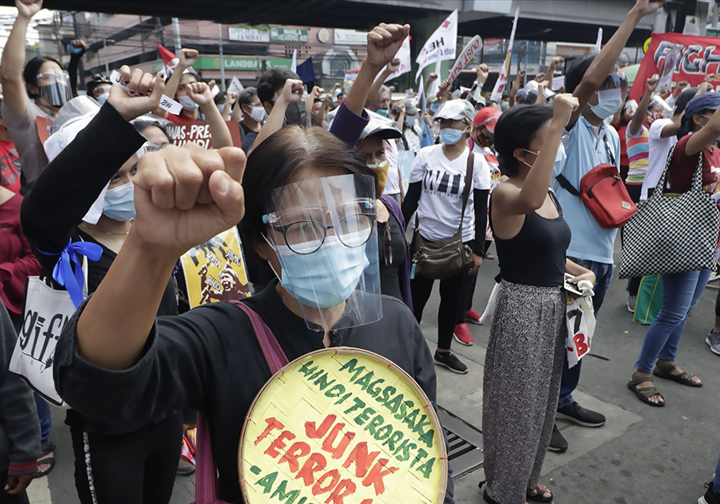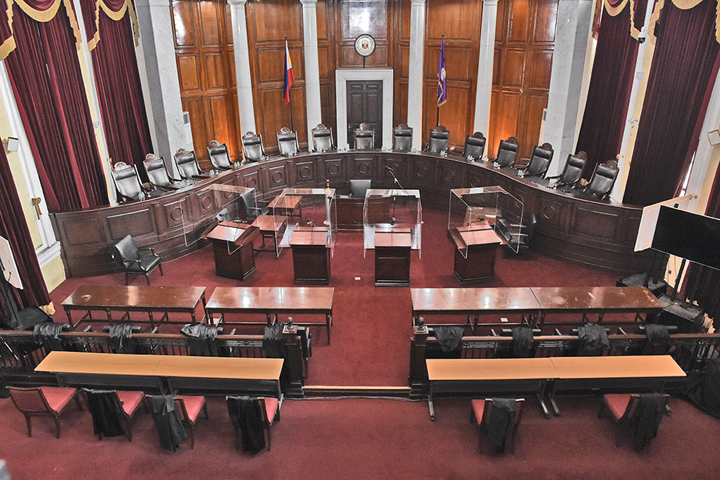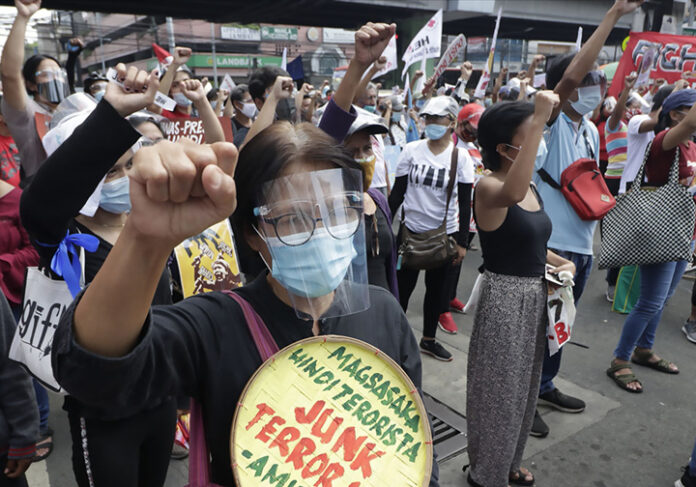THE Supreme Court was urged on Tuesday by various groups and individuals seeking to scrap the Anti-Terrorism Act of 2020 to uphold the supremacy of the Constitution over the controversial law.
At oral arguments on the 37 petitions seeking to declare ATA unconstitutional, former Solicitor General Jose Anselmo Cadiz told the Court that Filipinos are facing “real and imminent danger” to both constitutionally guaranteed civil liberties and separation of powers.

He described the current controversy as “a colossal battle” between the 1987 Constitution and the ATA.
“Presently, the Anti-Terror Law is running roughshod over the Constitution, particularly the Bill of Rights,” Cadiz said.
“We thus come to plead with you to snatch our Constitution from the jaws of defeat and restore its primacy, against the Anti-Terror Law,” he added.
Cadiz argued that ATA would harm the exercise of civil rights more than provide security against terrorism, since it allows warrantless arrests and prolonged detention, unreasonable searches and seizures, unwarranted intrusion into private communication and correspondence, curtailment of expression and assembly, denial of bail and the presumption of innocence and access to public information.

“These sanctioned intrusion on our civil liberties are strictly enjoined by the Constitution. To paraphrase People vs. Sapia, this battle waged against terror that tramples upon the rights of the people, is actually a war against the people,” Cadiz said.
Cadiz said the petitioners have the legal standing to initiate petitions and the issues raised by them were ripe for judicial review.
People power punishable
Human-rights lawyer Jose Diokno told the Court the ATA is the only law in the country that includes the exercise of fundamental rights in its definition of the crime.
Diokno noted the definition of terrorism in Section 4 of the ATA: terrorism excludes advocacy, protest and similar exercise of civil and political right provided that these are not intended to cause death or serious physical harm, endanger a person’s life or create a serious risk to public safety.
He explained that the Anti-Terrorism Council had recognized, in the ATA’s IRR, that one who exercises basic rights may still be liable for terrorism based on “requisite intent and purpose”
Unfortunately, Diokno said the ATA offers a “smorgasbord of acts, intents and purposes” which gives law enforcers the power to arrest any citizen based on their own impression and interpretation of the person’s intent.
“Any law enforcer can presume the intent of the person exercising its right,” Diokno told Associate Justice Rosmari Carandang during interpellation.
If ATA is not struck down, Diokno said calls, tweets, or social-media posts urging people to join a peaceful rally, to boycott certain companies, to hold a transport strike and even People Power could result in arrest and criminal prosecution under the ATA.
“No other law makes the exercise of constitutional rights a crime when actuated by a certain intent. No other law empowers the State to arrest its people for exercising rights guaranteed by the Constitution, based solely on a law enforcer’s subjective opinion of their state of mind,” Diokno told the magistrates.
Not a political department
Lawyer Alfredo Molo III, who argued against the ATA, was questioned by Associate Justice Marvic Leonen on whether there is an actual case and controversy and sufficient facts to warrant the Court’s action on the issue.
Leonen cited several unanimous decisions of the Court that prevent it from issuing advisory opinion apart from actual case and controversy.
“I think many of us have difficulty, although we understand the positions of many of the petitioners, we understand the fears. Personally, I truly understand the kind of fears that you are undergoing, having undergone those fears myself when I was a public interest lawyer. I understand that,” Justice Leonen said.
But, Leonen added, “with the hat now of a justice of this Court and with this judiciary, I think it is correct for us to assume that we should be careful not to become a political department…not to substitute our political wisdom to the political wisdom of, let us say, those that have crafted this law and those that have advised the President, including the National Security Adviser…give advice to the President and perhaps even to some key leaders of Congress.
“So, only in an actual case where it can be clear, there can be a clear and convincing demonstration that there is repugnancy with the specific text in the Constitution will there be an act of this Court?” Leonen asked.
Associate Justice Estela Perlas-Bernabe noted the similarity in ATA’s definition of terrorism and that by experts from various international instruments, such as the UN Security Council Resolution 1566, the International Convention for the Suppression of Terrorist Bombings and the International Convention for the Suppression of Acts of Nuclear Terrorism.
“All of these instruments have resemblance of similarity with our definition of terrorism, and terrorism is generally characterized as acts intended to cause deaths and serious bodily injury and cause extensive damage to property,” Bernabe said.
Diokno, Cadiz and Molo argued on the issues under Clusters 1 and 2.
Cluster 1 is on the preliminary issues—whether petitioners have legal standing to sue and if Republic Act 11479 should be declared unconstitutional in its entirety if the Court finds the definition of terrorism as well as the powers of the Anti-Terrorism Council (ATC) are constitutionally infirm.
Cluster 2 is on whether facial challenge is proper; and if the definition of “terrorism” in Section 4 is void for being vague and overbroad, in violation of constitutional rights such as free speech and expression.
It also asks if Section 5-14 defining and penalizing threats to commit terrorism and others are void for vagueness and overbroad and violate constitutional rights.
Cluster 3 raises questions on whether ATC’s powers are unconstitutional. Issues here were tackled by lawyer Evalyn Ursua.
Lawyer Neri Colmenares argued on the issues in Cluster 4—whether Section 16 violates the constitutional rights to due process and against unreasonable searches and seizures, privacy of communication and freedom of speech and freedom of religion.
Cluster 5—the ATC’s power to detain without judicial warrant based on mere suspicion—was tackled by Rep. Edcel Lagman .
Cluster 6—whether RA 11479 violates the Indigenous People and Moro’s rights to self-determination and self-governance under the Constitution—was argued by lawyer Algamar Latiph.
The SC magistrates have yet to interpellate the lawyers on the issues raised in Clusters 2 to 6, as it decided to continue the oral arguments next Tuesday.

